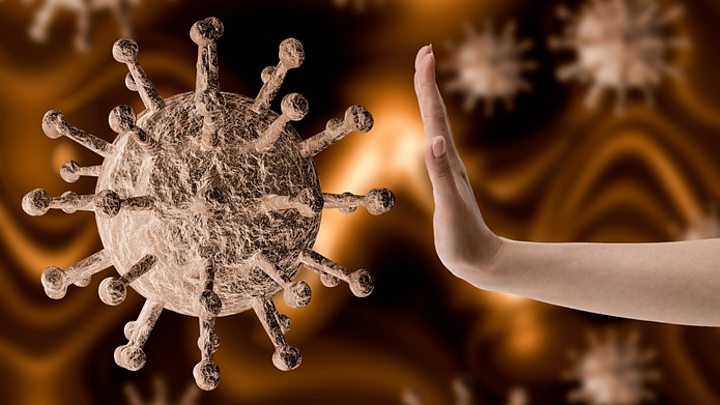Health officials have contacted hundreds of conference attendees in London, after it emerged one of them was later diagnosed with coronavirus.
The person, who has not been identified, was at the UK Bus Summit at the QEII Conference Centre last week.
Two Labour MPs who were also at the conference said they were well but cancelling public engagements until 20 February as a precaution.
So far, nine people in the UK have tested positive for the virus.
MP Lilian Greenwood - a former chair of the transport select committee - spoke at the 6 February conference in Westminster, which was attended by about 250 people from the bus and transport industry.
She said on Twitter she was "feeling completely well" but to be "extra-cautious" she was cancelling her public engagements for two weeks from the date of the conference, in line with advice from Public Health England.
Her colleague Alex Sobel, MP for Leeds North West, said he has been told he was "very low risk" but called NHS non-emergency telephone service 111 to be "formally assessed". He said he was not exhibiting any symptoms.
Mr Sobel's office said he was avoiding contact with others while waiting to hear back from 111.
He had cancelled all events and appointments until next Thursday as a precaution and would likely be staying at home with his family for most of the time.
Transport Times, the organiser of the conference, sent an email on Thursday afternoon to attendees informing them that a person confirmed to have coronavirus - which causes an illness now named Covid-19 - had been at the event.
The email included advice from PHE urging delegates that no action was needed if they felt well, but if they developed symptoms such as a fever or cough they should stay indoors, avoid contact with others and call NHS 111.
The letter told people to follow the advice until 20 February, "even if your symptoms are minor".

Media playback is unsupported on your device
Dr Chow, a PHE consultant in health protection, said: "One of our main priorities has been to identify any people who we think have been in close contact with confirmed cases of Covid-19 to provide public health advice, as they may be at slightly increased risk of catching the virus.
"While the degree of contact conference delegates may have had with the case is unlikely to have been significant, we have taken a precautionary approach and informed them of the situation."
Nine cases
According to the latest figures, more than 1,300 people are now known to have died from the virus, the majority in China.
According to the Press Association news agency, the conference case is not linked to the latest person in the UK to test positive for the virus earlier this week, a Chinese woman.
The woman, who caught the virus in China before flying to the UK, went to hospital in an Uber but PHE said the driver is not at "high risk". It was the first case to be identified in London.
As of 14:00 on Friday, tests for the virus have been carried out on 2,964 people in the UK - with all but nine being negative.
In addition to the patient being treated at St Thomas' Hospital in London, the UK's coronavirus cases include two Chinese nationals who tested positive in York.
Another cluster of cases began with British businessman Steve Walsh, who contracted the virus in Singapore and passed it to 11 people at a ski resort in France. Five of these returned to the UK. Mr Walsh has now recovered.
Meanwhile, more than 80 people who stayed in accommodation at Arrowe Park Hospital in Wirral for two weeks have left after testing negative for the new strain of coronavirus.
They are one of two groups of British nationals evacuated from Wuhan, with the second quarantined near Milton Keynes.
On Thursday, the head of NHS England Sir Simon Stevens warned that many more people may be forced to self-isolate as part of efforts to stop the coronavirus spreading in Britain.
What are the symptoms of coronavirus and what can help stop its spread?
The main signs of infection are fever (high temperature) and a cough as well as shortness of breath and breathing difficulties.
Frequent hand washing with soap or gel, avoiding close contact with people who are ill and not touching your eyes, nose and mouth with unwashed hands, can help cut the risk of infection.
Catching coughs and sneezes in a tissue, binning it and washing your hands can minimise the risk of spreading disease.
Anyone experiencing symptoms, even if mild, after travelling from mainland China, Thailand, Japan, Republic of Korea, Hong Kong, Taiwan, Singapore, Malaysia or Macau, is advised to stay indoors and call the NHS 111 phone service.
Read more about the coronavirus
SHOULD WE WORRY? Our health correspondent explains
YOUR QUESTIONS: Can you get it more than once?
WHAT YOU CAN DO: Do masks really help?
UNDERSTANDING THE SPREAD: A visual guide to the outbreak
LIFE UNDER LOCKDOWN: A Wuhan diary
ECONOMIC IMPACT: Why much of 'the world's factory' remains closed
Have you been affected by the issues raised in this article? If so get in touch by emailing haveyoursay@bbc.co.uk.
Please include a contact number if you are willing to speak to a BBC journalist. You can also contact us in the following ways:
https://news.google.com/__i/rss/rd/articles/CBMiJGh0dHBzOi8vd3d3LmJiYy5jb20vbmV3cy91ay01MTUwMzI5MtIBKGh0dHBzOi8vd3d3LmJiYy5jb20vbmV3cy9hbXAvdWstNTE1MDMyOTI?oc=5
2020-02-14 11:38:45Z
52780608732371
Tidak ada komentar:
Posting Komentar